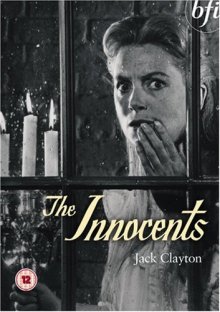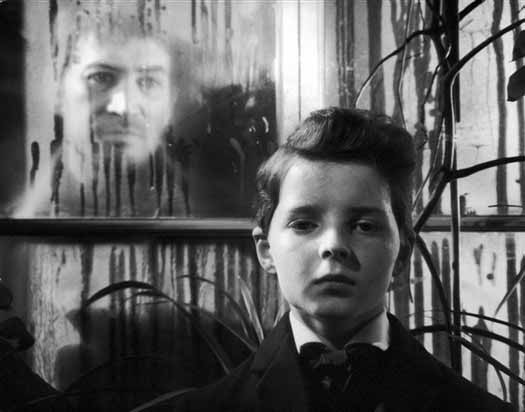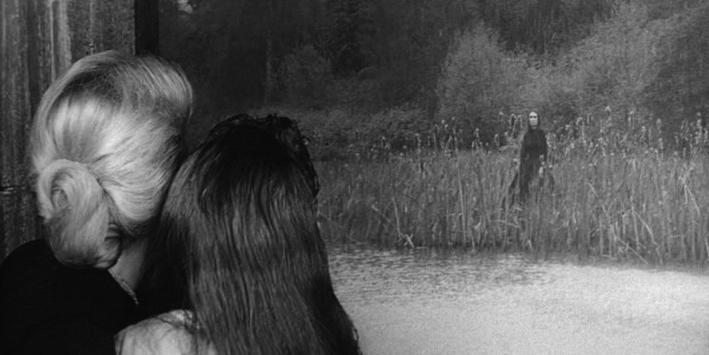 “Do They Ever Return to Possess the Living?”
“Do They Ever Return to Possess the Living?”
That was the question asked in the advertising for this adaptation of Henry James’ classic novelette, The Turn of the Screw.It is a question that goes unanswered by the film itself, which true to the source material leaves the existence of ghosts unclear, forcing audiences to debate whether Quint (Peter Wyngarde) and Miss Jessel (Clytie Jessop) are really visitors from the grave or simply figments of the demented imagination of governess Miss Giddens (Deborah Kerr). Imagine yourself as the young English governess, given sole responsibility for two young children growing up in an isolated country manor. Shortly after assuming this position (your first), you begin to see the ghosts of your unfortunate predecessor and her lover, a valet with an evil reputation. At first you seek to shield your young charges from the horror haunting the house, but soon you come to believe that your young charges are not only fully aware of the ghosts but actively in league with them. You cannot seek outside help without seeming mad, and your employer, the uncle of the orphaned children, wants under no circumstances to be bothered, leaving you to face the situation alone, and unguided. How can you stop the these visitors from the grave from claiming the “innocents” as their prey?
This unresolved mystery charges the events of THE INNOCENTS with a dreadful sense of uncertainty far more thrilling than the simple supernatural chills of a typical haunted house movie – another “turn of the screw,” as James would have said. At the same time, the ambiguous narrative serves up its share of suggestive shivers; its ghostly apparitions, achieved without special effects, convey a palpable sense of horror. Glimpsed at a distance or through windows, lurking in the shadows of night but sometimes revealing themselves by day, are utterly convincing and magnificently threatening without ever actually doing anything; their supernatural stillness, as much as anything else, sends shivers down the backbone, playing the vertebrae like a skeletal hand tapping on a xylophone.
Truman Capote`s screenplay plays upon the ambiguity of James` tale: are the two children really possessed by the ghosts of the dead, or is their governess merely imagining everything? Producer-director Jack Clayton keeps the film firmly grounded in reality, so that the intrusion of the supernatural strikes far more strongly.
The overt horror in THE INNOCENTS takes the form of Quint and Miss Jessel – tangible apparitions who appear as solid as a living beam, not like some gauzy ghost. Miss Jessel is the more reticent of the two, waling in the shadows at the end of a hallway, standing on the shore across a lake, or crying in a school room. Quint seems more aggressive. First glimpsed atop a tower, he is later seen peering through windows, his expressions paralleling those of Miles, as if the dead valet were the puppeteer pulling the strings of the young lad.

In way, however, the real horror of the film resides in the children. Are Miles and Flora innocent, or are they in league with the ghosts? Martin Stephens and Pamela Franklin are excellent, their too perfectly precocious innocence suggesting that Miss Giddens’ fears may have some basis in reality after all. Stephens is given more opportunity to shine, but Franklin (who would go on to star in 1974’s THE LEGEND OF HELL HOUSE) holds her own, delivering lovely lines of twisted dialogue such as “Oh, look – there’s a lovely spider, and it’s eating a butterfly!”
Deborah Kerr gives a superb performance, conveying Miss Giddens’ desperate desire to help while overtly suggesting a note of repressed hysteria, hinting that the ghosts may be externalizations of her own inner demons. Kerr brings this complex, redoubtable character to life in THE INNOCENTS with an added layer of her own. In the book, the governess was in her early twenties at most; her youth and inexperience could excuse this missteps she makes in her dire circumstances. Kerr, although youthful, was clearly older than the book’s character, yet she played the part with the naiveté of an inexperienced woman, while adding a range of affected mannerisms hinting at hidden neurosis. Consequently, she comes across as a spinster in the making, her repressed sexuality bubbling to the surface in her obvious attraction to her employer (whom she sees only once, during the job interview that opens the film) and in her reaction to learning that her predecessor engaged stormy nearly sado-masochistic relationship with the valet, a man clearly her social inferior (an unforgivable taboo for a Victorian woman).
Oscar-winner Freddie Francis delivers excellently black-and-white photography in beautiful widescreen Cinemascope. When Miss Giddens wanders the shadowy halls of Bly at night, candelabra in hand as she follows the whispered words of Quint and Jessel, the scene superficial resembles typical horror movie cliches, but it is handled with grand flair, including some clever camera effects to suggest that the moving candles truly are lighting the scene. In the days before film could rely on available light, Francis had special filters fashioned that created a spotlight-like effect, with the image bright in the center of the frame and tapering off to darkness toward the edges. The sequence is perhaps the closest the film comes to visualizing a cinematic equivalent of James’ prose, with the haunting effects serving equally well as evidence of the supernatural or the psychological.
Seen decades after its initial release, THE INNOCENTS is clearly a relic from a bygone era, before The Haunting (1963), The Legend of Hell House (1973), Poltergeist (1982), and the remake of The Haunting (1999) had moved the haunted house sub-genre toward ever more jarring effects. Yet THE INNOCENTS continues to trump all of their best efforts. As frightening as some of those films are, none of them sucker punch the audience with the devastating emotional wallop of Clayton’s masterpiece. The ending seems designed with almost deliberate sadism, building the climax to a breath-taking crescendo and then fading away to an eerie silence that perfectly captures the feel of the novel’s closing line: “We were alone with the quiet day, and his little heart, dispossessed, had stopped.”
DVD DETAILS
The 20th Century Fox DVD offers a two-sided disc, one with a widescreen transfer, the other with a full screen transfer. The audio is available in English stereo or Spanish mono, with options for English or Spanish subtitles. Bonus features (the same on both sides of the disc) are limited to the film’s theatrical trailer, plus some clips and recommendations for other Fox home video releases (LEGEND OF HELL HOUSE, PHANTOM OF THE PARADISE).
The film is divided into 28 chapters, with titles like “Tears of a Ghost.” The menu images culled from the black-and-white film have been colorized. Both transfers retain the photography’s beautiful contrast of light-and-shadow. The full screen version is not too bad an alternative if you do not have a widescreen television; much of it looks quite nice, but several shots do betray the loss of picture image around the sides. The widescreen transfer is of course preferable, preserving the widescreen compositions of the Cinemascope photography, particularly in shots like the one below, of Miss Giddens forcing Flora to confront the ghost of Miss Jessel (the two heads in the foreground, which are matted into the shot, not filmed live on location, are almost cropped off in the full screen version).

The trailer is a bit schizophrenic. It emphasizes THE INNOCENT’s serious approach to the ghost story, citing the resptable credits of Kerr and Clayton, but there seems to be a deliberate attempt to pump up the volume, including an echoing voice that asks the question quoted at the top of this review. The words are illustrated in eerie letters superimposed over a swirling, almost psychedelic vortex of black-and-white (an image not in the film, which was presumably achieved with paint in a tank). There is also an odd moment when the originally recorded soundtrack rather obviously drops out: the music and background effects disappear while the narrator reads the screenwriting credit for William Archibald and Truman Capote. (Presumably, the final screen credit changed, and the narration had to be re-recorded and awkwardly dropped in.)
Needless to say, this bare-bones presentation does not do justice to Jack Clayton’s classic.. One hopes that, someday, Fox will release a special edition disc loaded with bonus features.
THE INNOCENTS (1961). Produced and directed by Jack Clayton. Screenplay by William Archibald and Truman Capote, basedon the play by Archibald and the novel The Turn of the Screwby Henry James, additional scenes and dialgoue by John Mortimer. Cast: Deborah Kerr, Martin Stephens, Pamela Franklin, Megs Jenkins, Michael Redgrave, Peter Wyngarde, Clytie Jessop.






 “Do They Ever Return to Possess the Living?”
“Do They Ever Return to Possess the Living?”
